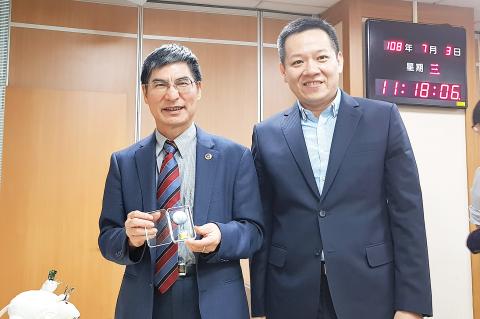A team of National Tsing Hua University (NTHU) researchers yesterday shared their findings on a microchip system for neurological disorders, saying it might help people with Parkinson’s disease.
The system is one of the projects funded by the Ministry of Science and Technology under its Academia-Industry Research Alliance project launched in 2017.
Deep brain stimulators are one of the options for treating Parkinson’s disease with electrical stimuli, but the surgery to place a stimulator in a patient’s brain can be difficult and dangerous, Chen Hsin (陳新), a professor in the university’s department of electrical engineering, told a news conference at the ministry in Taipei.

Photo: Chien Hui-ju, Taipei Times
Chen said he became interested in seeking solutions for Parkinson’s treatment after seeing what a family member who has the disease has gone through.
Current stimulators cannot be adjusted to release proper amount of stimuli according to individual needs, either, he said.
When he started to explore possible connection between engineering and biomedicine about 15 years ago, there was almost no crossover between the two disciplines, he said.
However, by working with chipmaker United Microelectronics Corp, NTHU and National Chiao Tung University electrical engineers and life science researchers as well as doctors from Chang Gung Memorial Hospital, his team developed a theranostic microchip that integrates neurological stimuli and recording, wireless electricity connection and data transmission functions, Chen said.
Measuring 5mm2, it is likely the world’s smallest biochip among those used in clinical practices, he said, adding that biochips being developed are not likely to be smaller.
The team has also developed the chip’s wireless stimuli controller, which has proved effective on experiments with mice and won a special prize in this year’s Computex development and innovation awards, he said.
The system is expected to enter clinical testing by 2022, he added.
Since 2017, the ministry has provided more than NT$116 million (US$3.73 million at the current exchange rate) to fund 56 projects related to integrated circuit design, manufacturing and packaging tests undertaken by eight universities, Deputy Minister of Science and Technology Hsu Yu-chin (許有進) said.
More than 30 private companies have provided more than NT$230 million to support development efforts, Hsu said.
Taiwan’s semiconductor industry is third in the world after the US and South Korea, but there is no knowing whether it might be outperformed by more nations, Etron Technology founder and chairman Nicky Lu (盧超群) said.
The industry needs more innovations and talent cultivation, he said.

Taiwanese can file complaints with the Tourism Administration to report travel agencies if their activities caused termination of a person’s citizenship, Mainland Affairs Council Minister Chiu Chui-cheng (邱垂正) said yesterday, after a podcaster highlighted a case in which a person’s citizenship was canceled for receiving a single-use Chinese passport to enter Russia. The council is aware of incidents in which people who signed up through Chinese travel agencies for tours of Russia were told they could obtain Russian visas and fast-track border clearance, Chiu told reporters on the sidelines of an event in Taipei. However, the travel agencies actually applied

Japanese footwear brand Onitsuka Tiger today issued a public apology and said it has suspended an employee amid allegations that the staff member discriminated against a Vietnamese customer at its Taipei 101 store. Posting on the social media platform Threads yesterday, a user said that an employee at the store said that “those shoes are very expensive” when her friend, who is a migrant worker from Vietnam, asked for assistance. The employee then ignored her until she asked again, to which she replied: "We don't have a size 37." The post had amassed nearly 26,000 likes and 916 comments as of this

US President Donald Trump said "it’s up to" Chinese President Xi Jinping (習近平) what China does on Taiwan, but that he would be "very unhappy" with a change in the "status quo," the New York Times said in an interview published yesterday. Xi "considers it to be a part of China, and that’s up to him what he’s going to be doing," Trump told the newspaper on Wednesday. "But I’ve expressed to him that I would be very unhappy if he did that, and I don’t think he’ll do that," he added. "I hope he doesn’t do that." Trump made the comments in

New measures aimed at making Taiwan more attractive to foreign professionals came into effect this month, the National Development Council said yesterday. Among the changes, international students at Taiwanese universities would be able to work in Taiwan without a work permit in the two years after they graduate, explainer materials provided by the council said. In addition, foreign nationals who graduated from one of the world’s top 200 universities within the past five years can also apply for a two-year open work permit. Previously, those graduates would have needed to apply for a work permit using point-based criteria or have a Taiwanese company